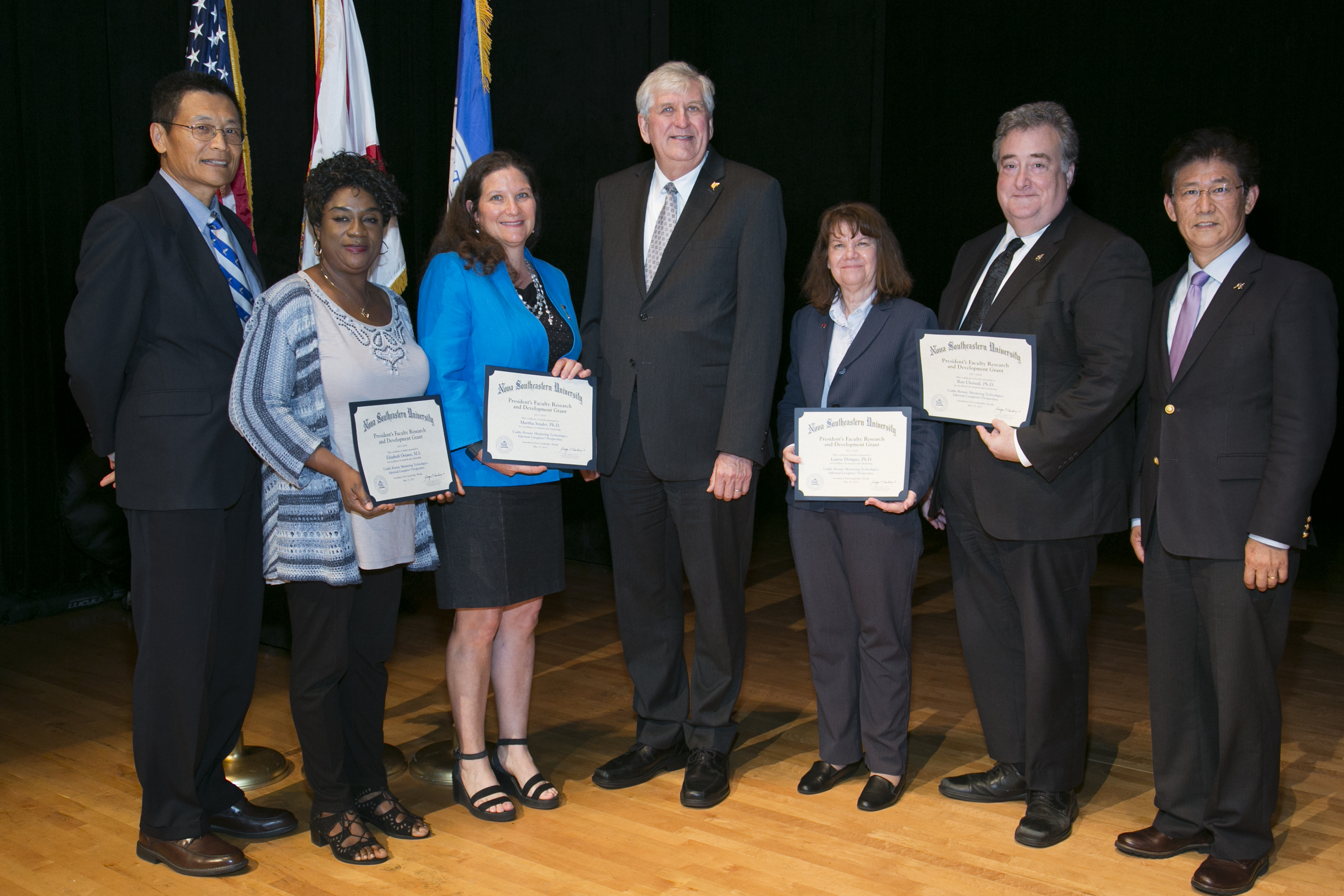Usable Remote Monitoring Technologies: Informal Caregivers’ Perspectives
Grant Winners
- Martha Snyder, Ph.D. – College of Engineering and Computing
- Laurie Dringus, Ph.D. – College of Engineering and Computing
- Ron Chenail, Ph.D. – College of Arts, Humanities and Social Sciences
- Elizabeth Oviawe, M.S. – College of Osteopathic Medicine
Deans
- Yong Tao, Ph.D. – College of Engineering and Computing
- Honggang Yang, Ph.D. – College of Arts, Humanities and Social Sciences
- Elaine Wallace, D.O., M.S., M.S., M.S. – College of Osteopathic Medicine
Abstract

The desire to maintain an independent lifestyle is one shared by an increasing number of older adults as well as persons with disabilities. Family and friends, also known as informal caregivers, play an integral role in helping their loved ones maintain independence. Remote monitoring technologies (RMTs) such as wearable sensors, mobile emergency devices, and teleoperated robots can be used to sense, record, and communicate a person’s daily activities. However, an understanding is limited of the informal caregiver’s needs and perceptions of RMTs used in an in-home setting. The purpose of this qualitative research study is to explore how informal caregivers perceive RMTs and their use for monitoring and supporting their care recipients who choose to live independently. A survey will be used to gather relevant factors such as demographic and socio-economic data and current knowledge and experiences with RMTs in order to describe the general context and current state of informal caregivers’ RMT awareness and use. Semi-structured interviews with a small subset (8-10) of survey participants will be used to gain a more in-depth understanding of the unique caregiving experiences, the tasks they perform, their perceived use of existing RMTs including benefits and risks, and concerns about RMT adoption and use. Interpretative phenomenological analysis will guide the interpretation of the interview transcripts. Findings will be presented through a descriptive and interpretative summary. This study will serve as the basis for developing awareness and training programs that will assist informal caregivers and their care recipients in adoption and use of existing RMTs, as well as engineering the design of new user-centered RMT prototypes.
 The desire to maintain an independent lifestyle is one shared by an increasing number of older adults as well as persons with disabilities. Family and friends, also known as informal caregivers, play an integral role in helping their loved ones maintain independence. Remote monitoring technologies (RMTs) such as wearable sensors, mobile emergency devices, and teleoperated robots can be used to sense, record, and communicate a person’s daily activities. However, an understanding is limited of the informal caregiver’s needs and perceptions of RMTs used in an in-home setting. The purpose of this qualitative research study is to explore how informal caregivers perceive RMTs and their use for monitoring and supporting their care recipients who choose to live independently. A survey will be used to gather relevant factors such as demographic and socio-economic data and current knowledge and experiences with RMTs in order to describe the general context and current state of informal caregivers’ RMT awareness and use. Semi-structured interviews with a small subset (8-10) of survey participants will be used to gain a more in-depth understanding of the unique caregiving experiences, the tasks they perform, their perceived use of existing RMTs including benefits and risks, and concerns about RMT adoption and use. Interpretative phenomenological analysis will guide the interpretation of the interview transcripts. Findings will be presented through a descriptive and interpretative summary. This study will serve as the basis for developing awareness and training programs that will assist informal caregivers and their care recipients in adoption and use of existing RMTs, as well as engineering the design of new user-centered RMT prototypes.
The desire to maintain an independent lifestyle is one shared by an increasing number of older adults as well as persons with disabilities. Family and friends, also known as informal caregivers, play an integral role in helping their loved ones maintain independence. Remote monitoring technologies (RMTs) such as wearable sensors, mobile emergency devices, and teleoperated robots can be used to sense, record, and communicate a person’s daily activities. However, an understanding is limited of the informal caregiver’s needs and perceptions of RMTs used in an in-home setting. The purpose of this qualitative research study is to explore how informal caregivers perceive RMTs and their use for monitoring and supporting their care recipients who choose to live independently. A survey will be used to gather relevant factors such as demographic and socio-economic data and current knowledge and experiences with RMTs in order to describe the general context and current state of informal caregivers’ RMT awareness and use. Semi-structured interviews with a small subset (8-10) of survey participants will be used to gain a more in-depth understanding of the unique caregiving experiences, the tasks they perform, their perceived use of existing RMTs including benefits and risks, and concerns about RMT adoption and use. Interpretative phenomenological analysis will guide the interpretation of the interview transcripts. Findings will be presented through a descriptive and interpretative summary. This study will serve as the basis for developing awareness and training programs that will assist informal caregivers and their care recipients in adoption and use of existing RMTs, as well as engineering the design of new user-centered RMT prototypes.